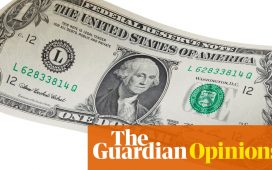Global financial markets have scaled back expectations for an imminent cut in interest rates on both sides of the Atlantic after figures showed US inflation rose by more than expected in March.
Figures from the US Department of Labor show a jump in fuel and housing rental costs drove up the consumer price index (CPI) to 3.5% in March compared with a year earlier, higher than expected by Wall Street economists.
In a development triggering a sell-off in financial markets, monthly inflation and core CPI – which removes volatile items including energy and food – also rose by more than predicted.
US government bond yields rose sharply, while shares fell in New York amid speculation that stubborn inflationary pressures could force the US Federal Reserve to delay cutting interest rates.
“Expectations for a June Federal Reserve interest rate cut have collapsed,” said James Knightley, chief international economist at the Dutch bank ING. “July is also doubtful, meaning September is the more probable start point of any easing, which would limit the Fed to a maximum of just three rate cuts this year.”
The figures also led traders to slash bets for the Bank of England to cut borrowing costs in June, amid concerns that inflation in the US and the UK could persist at higher levels than previously thought.
Financial markets are now pricing a 54% chance of the UK central bank keeping interest rates unchanged in June, having previously reflected a greater probability of a cut before the US inflation figures were released.
Inflation in the world’s largest economy has fallen sharply from a high of over 9% in 2022 but has remained stubbornly above the Fed’s target rate of 2%. Inflation in the UK has fallen from over 10% last year to 3.4% in February. Figures for March are due to be published next week.
The latest figures from the US show March’s increase was driven by rising costs for shelter and gasoline. “Combined, these two indexes contributed over half of the monthly increase in the index,” the labor department said. Gasoline rose 1.7% from the previous month and is 1.3% higher than the same time last year. Shelter is 5.7% higher than a year ago and rose 0.4% over the month.
Ryan Stewart, chief US economist at Oxford Economics, pointed out that gasoline prices typically rise this time of year. “But it still has economic costs as every $0.01 rise in retail gasoline prices reduces consumer spending between $1bn and $1.5bn over the course of a year,” he wrote in a note to investors.
The Fed increased its benchmark interest rate from near zero to over 5% over the last 16 months in a bid to cool inflation. Recently the central bank has held off on further rate rises and economists had expected rate cuts later this year. Those hopes have faded in recent weeks amid signs that inflation has remained sticky.
The US central bank has a twin mandate – to keep prices under control and achieve maximum employment. The jobs market has remained robust despite the Fed’s attempts to cool the economy, adding 303,000 positions last month.
The inflation news will further complicate November’s US elections, as Joe Biden attempts to point to progress in the American economy. Nearly 15.2m jobs have been created since he took office and unemployment has remained below 4% for the longest stretch in 50 years. Meanwhile stock markets have hit record highs and inflation – while above the Fed’s target – has fallen sharply.
But polling shows that voters are unhappy with the president’s economic stewardship, inflation and high interest rates. Some economists are now predicting that the Fed may not begin cutting rates until after the election.
In a statement, Biden said: “Today’s report shows inflation has fallen more than 60% from its peak, but we have more to do to lower costs for hardworking families. Prices are still too high for housing and groceries, even as prices for key household items like milk and eggs are lower than a year ago.”
Biden called on corporations to use their “record profits to reduce prices” and attacked Republicans who he said “want to slash taxes for billionaires and big corporations, while helping special interests and big pharma raise prices”.
On his social media site Truth Social, Biden’s presidential rival Donald Trump wrote: “INFLATION is BACK—and RAGING! The Fed will never be able to credibly lower interest rates, because they want to protect the worst President in the history of the Untied [sic] States!”





